
Wilhelm Richard Wagner was a German composer, theatre director, polemicist, and conductor who is chiefly known for his operas. Unlike most opera composers, Wagner wrote both the libretto and the music for each of his stage works. Initially establishing his reputation as a composer of works in the romantic vein of Carl Maria von Weber and Giacomo Meyerbeer, Wagner revolutionised opera through his concept of the Gesamtkunstwerk, by which he sought to synthesise the poetic, visual, musical and dramatic arts, with music subsidiary to drama. He described this vision in a series of essays published between 1849 and 1852. Wagner realised these ideas most fully in the first half of the four-opera cycle Der Ring des Nibelungen.
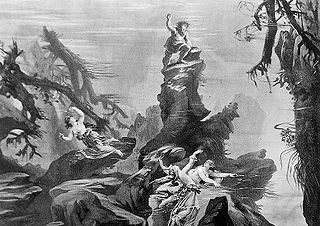
Der Ring des Nibelungen, WWV 86, is a cycle of four German-language epic music dramas composed by Richard Wagner. The works are based loosely on characters from Germanic heroic legend, namely Norse legendary sagas and the Nibelungenlied. The composer termed the cycle a "Bühnenfestspiel", structured in three days preceded by a Vorabend. It is often referred to as the Ring cycle, Wagner's Ring, or simply The Ring.

Das Rheingold, WWV 86A, is the first of the four epic music dramas that constitute Richard Wagner's Der Ring des Nibelungen. It was performed, as a single opera, at the National Theatre Munich on 22 September 1869, and received its first performance as part of the Ring cycle at the Bayreuth Festspielhaus, on 13 August 1876.
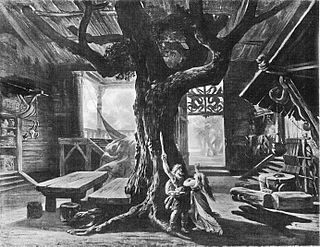
Die Walküre, WWV 86B, is the second of the four epic music dramas that constitute Richard Wagner's Der Ring des Nibelungen. It was performed, as a single opera, at the National Theatre Munich on 26 June 1870, and received its first performance as part of the Ring cycle at the Bayreuth Festspielhaus on 14 August 1876.

In German heroic legend, Alberich is a dwarf. He features most prominently in the poems Nibelungenlied and Ortnit. He also features in the Old Norse collection of German legends called the Thidreksaga under the name Alfrikr. His name means "ruler of supernatural beings (elves)", and is equivalent to Old French Alberon or Auberon.

The Bayreuth Festival is a music festival held annually in Bayreuth, Germany, at which performances of stage works by the 19th-century German composer Richard Wagner are presented. Wagner himself conceived and promoted the idea of a special festival to showcase his own works, in particular his monumental cycle Der Ring des Nibelungen and Parsifal.
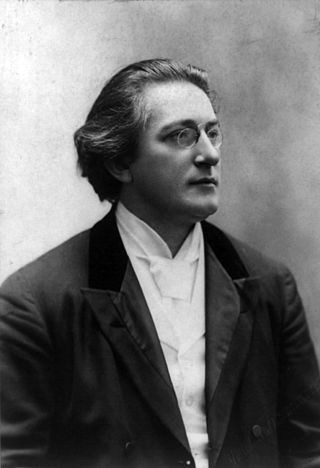
Anton Seidl was a Hungarian conductor, best known for his association with the Metropolitan Opera in New York City and the New York Philharmonic.

Johann Baptist Isidor Richter, or János Richter was an Austro-Hungarian orchestral and operatic conductor.
Harry Alfred Robert Kupfer was a German opera director and academic. A long-time director at the Komische Oper Berlin, he worked at major opera houses and at festivals internationally. Trained by Walter Felsenstein, he worked in the tradition of realistic directing. At the Bayreuth Festival, he staged Wagner's Der fliegende Holländer in 1978 and Der Ring des Nibelungen in 1988. At the Salzburg Festival, he directed the premiere of Penderecki's Die schwarze Maske in 1986 and Der Rosenkavalier by Richard Strauss in 2014.

The evolution of Richard Wagner's epic operatic tetralogy Der Ring des Nibelungen was a long and tortuous process, and the precise sequence of events which led the composer to embark upon such a vast undertaking is still unclear. The composition of the text took place between 1848 and 1853, when all four libretti were privately printed; but the closing scene of the final opera, Götterdämmerung, was revised a number of times between 1856 and 1872. The names of the last two Ring operas, Siegfried and Götterdämmerung, were probably not definitively settled until 1856.

Anton van Rooy was a Dutch bass-baritone. He had a voice of enormous proportions and is most remembered for his association with the music dramas of Richard Wagner, especially the Ring Cycle, The Mastersingers of Nuremberg and Parsifal.
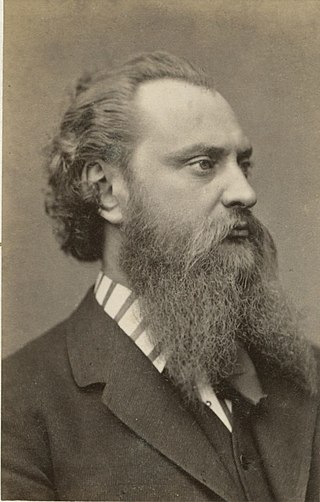
Albert Wilhelm Karl Niemann was a leading German operatic heldentenor especially associated with the operas of Richard Wagner. He gave important premieres in France, Germany, England and the United States, and played Siegmund in the first complete production of Der Ring des Nibelungen.
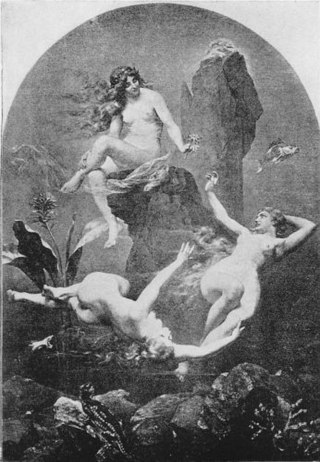
The Rhinemaidens are the three water-nymphs who appear in Richard Wagner's opera cycle Der Ring des Nibelungen. Their individual names are Woglinde, Wellgunde and Flosshilde (Floßhilde), although they are generally treated as a single entity and they act together accordingly. Of the 34 characters in the Ring cycle, they are the only ones who did not originate in the Old Norse Eddas. Wagner created his Rhinemaidens from other legends and myths, most notably the Nibelungenlied which contains stories involving water sprites (nixies) or mermaids of the Danube.
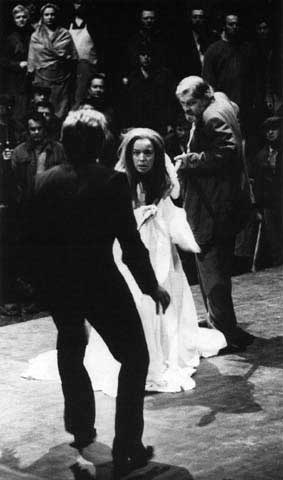
The Jahrhundertring was the production of Richard Wagner's Ring cycle, Der Ring des Nibelungen, at the Bayreuth Festival in 1976, celebrating the centenary of both the festival and the first performance of the complete cycle. The festival was directed by Wolfgang Wagner and the production was created by the French team of conductor Pierre Boulez, stage director Patrice Chéreau, stage designer Richard Peduzzi, costume designer Jacques Schmidt and lighting designer André Diot. The cycle was shown first in 1976, then in the following years until 1980. It was filmed for television in 1979 and 1980. While the first performance caused "a near-riot" for its brash modernity, the staging established a standard, termed Regietheater, for later productions.
Norma Sharp is an American operatic soprano. She is known for singing Mozart and Richard Strauss, but also sang Wagner roles at the Bayreuth Festival. She worked mostly in Germany, made an international career, and has been a professor of voice at the Hochschule für Musik "Hanns Eisler" from 1992.

Andreas Schager is an Austrian operatic tenor. He began his career as a tenor for operettas, but has developed into singing Heldentenor parts by Richard Wagner including Tristan, Siegmund, Siegfried and Parsifal. A member of the Staatsoper Berlin, he has appeared internationally at venues including La Scala, The Proms and the Bayreuth Festival.

Der Ring in Minden was a project to stage Richard Wagner's cycle Der Ring des Nibelungen at the Stadttheater Minden, beginning in 2015 with Das Rheingold, followed by the other parts in the succeeding years, and culminating with the complete cycle performed twice in 2019. The stage director was Gerd Heinz, and Frank Beermann conducted the Nordwestdeutsche Philharmonie, playing on the stage of the small theatre. The singers acted in front of the orchestra, making an intimate approach to the dramatic situations possible. The project received international recognition and was compared favourably to the Bayreuth Festival.
Thomas Mohr is a German operatic tenor and academic voice teacher. He began his career as a baritone, but moved on to heldentenor and has performed roles in all tenor parts of Wagner's Der Ring des Nibelungen at Der Ring in Minden. He has appeared at major international opera houses and concert halls, and made recordings. Mohr is a professor of voice at the Hochschule für Künste Bremen. He also runs an agricultural estate where he founded a music festival.

Josef Angelo Neumann was a German operatic baritone and theatre director. First a baritone at major opera houses in Europe, including the Vienna Imperial Opera, he was the managing director of the Leipzig Opera and the Estates Theatre in Prague. He is known as an early promoter of the stage works by Richard Wagner, namely the Ring cycle, which he presented with the sets and costumes of the world premiere at the Bayreuth Festival, first in Leipzig and then on a European tour.
Joachim Herz was a German Opera director and manager. He learned at the Komische Oper Berlin as an assistant to Walter Felsenstein. His major stations were the Leipzig Opera where he opened the new house with Wagner's Die Meistersinger von Nürnberg, Komische Oper and Semperoper in Dresden, where he opened the restored house with Weber's Der Freischütz in 1985. He staged many world premieres, and worked internationally. Herz was the first director to apply Felsenstein's concepts to Wagner's Der Ring des Nibelungen, staged in Leipzig from 1973 to 1976.















